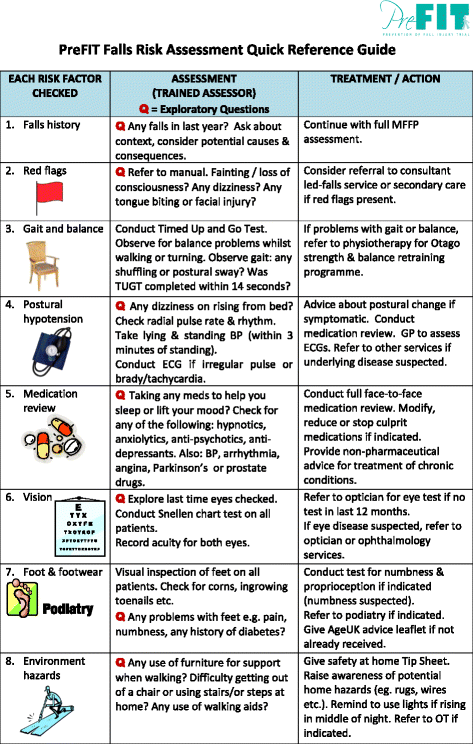The Best Strategy To Use For Dementia Fall Risk
The Best Strategy To Use For Dementia Fall Risk
Blog Article
Dementia Fall Risk Things To Know Before You Get This
Table of ContentsExcitement About Dementia Fall RiskThe Facts About Dementia Fall Risk UncoveredThe Only Guide to Dementia Fall RiskThe 5-Minute Rule for Dementia Fall RiskNot known Factual Statements About Dementia Fall Risk
Based on signs and symptoms, such as evidence of head injury or a new focal neurologic deficit, computed tomography or MRI of the brain might be shown. An assessment for causes of syncope should be conducted only if there is strong uncertainty, as when it comes to reoccurring, unusual falls
Medical care suppliers utilize a loss danger analysis to determine your threat aspects for dropping and make valuable recommendations. An autumn risk evaluation is important since recognizing which elements raise your possibilities of dropping helps you: Lessen your threat of falling or harming on your own.
All adults 65 years and older should have an initial fall risk screening. Have dropped in the previous year. Worry concerning dropping.
Dementia Fall Risk Things To Know Before You Buy

Discover this comprehensive nursing treatment plan and management guide to properly protect against danger for falls amongst people. Obtain crucial expertise regarding the nursing evaluation, nursing medical diagnosis, and objectives especially customized to patients that are at threat for drops. A is specified as an event that causes an individual coming to relax accidentally on the ground or flooring or other reduced degree (WHO, 2021).
Falling is the second leading reason of death from unintended injuries worldwide. It is estimated that fall death prices this contact form in the United state
The Facts About Dementia Fall Risk Revealed
If this rate continues, the CDC prepares for 7 fall deaths every hour by 2030.
Annually, over 800,000 people are hospitalized due to falls. Nurses play a significant function in preventing succumbs to their individuals with education and learning, assessing loss risk, creating safer atmospheres, and supplying treatments in protecting against injuries from drops. Numerous threat factors and conditions contribute to drops, consisting of the following:. Matured 65 years and older; reduced arm or leg prosthesis; usage of assistive gadgets such as pedestrian, crane, and mobility visit their website device; living alone.
Client will certainly demonstrate selective prevention actions. Client and caregivers will apply approaches to raise security and avoid falls in the home. Loss result from a number of elements, and a holistic strategy to the private and environment is essential. Expect a person is considered at high threat for falls after the screening.
Top Guidelines Of Dementia Fall Risk
A calls for utilizing a verified device that scientists have checked out to be helpful in calling the root causes of drops in an individual. As a person's health and wellness and circumstances modification, review is called for. The degree of autumn danger can be determined using the evaluation of inherent and external factors. Standard evaluation devices can additionally be made use of (discussed below).
Individuals are more probable to fall once again if they have sustained several drops in the previous 6 months. The older populace is at boosted danger of fall-related readmissions based on a research study recognizing the variables anticipating of repeat drops connected results (Prabhakaran et al., 2020). Persons with impaired awareness and disorientation may not understand where they are or what to do to help themselves.
Furthermore, confusion and damaged judgment boost the client's chance of dropping. The capability of people to shield themselves from drops is impacted by such factors as age and growth. Older people with weak muscles are more probable to fall than those that maintain muscular tissue stamina, flexibility, and endurance. These adjustments include reduced aesthetic function, damaged color assumption, change in center of mass, unsteady stride, reduced muscular tissue stamina, decreased endurance, modified depth understanding, and postponed reaction and response times.
Dementia Fall Risk Fundamentals Explained
Much less comparison sensitivity was quite related to both raised prices of drops and other injuries, while reduced aesthetic skill was just linked with increased fall rate (Wood et al., 2011). Sensory understanding of ecological stimulations is paramount to safety. Vision and hearing impairment limitation the individual's capacity to regard threats in the surroundings.
Older page adults who have poor balance or difficulty strolling are more probable to drop. These troubles might be linked with absence of workout or a neurological cause, arthritis, or other medical problems and treatments. A crucial risk factor highlighted in a study is that adults with rheumatoid arthritis go to high risk of drops, consisting of inflamed and tender reduced extremity joints, tiredness, and use of psychotropic medications (Stanmore et al., 2013).
Report this page